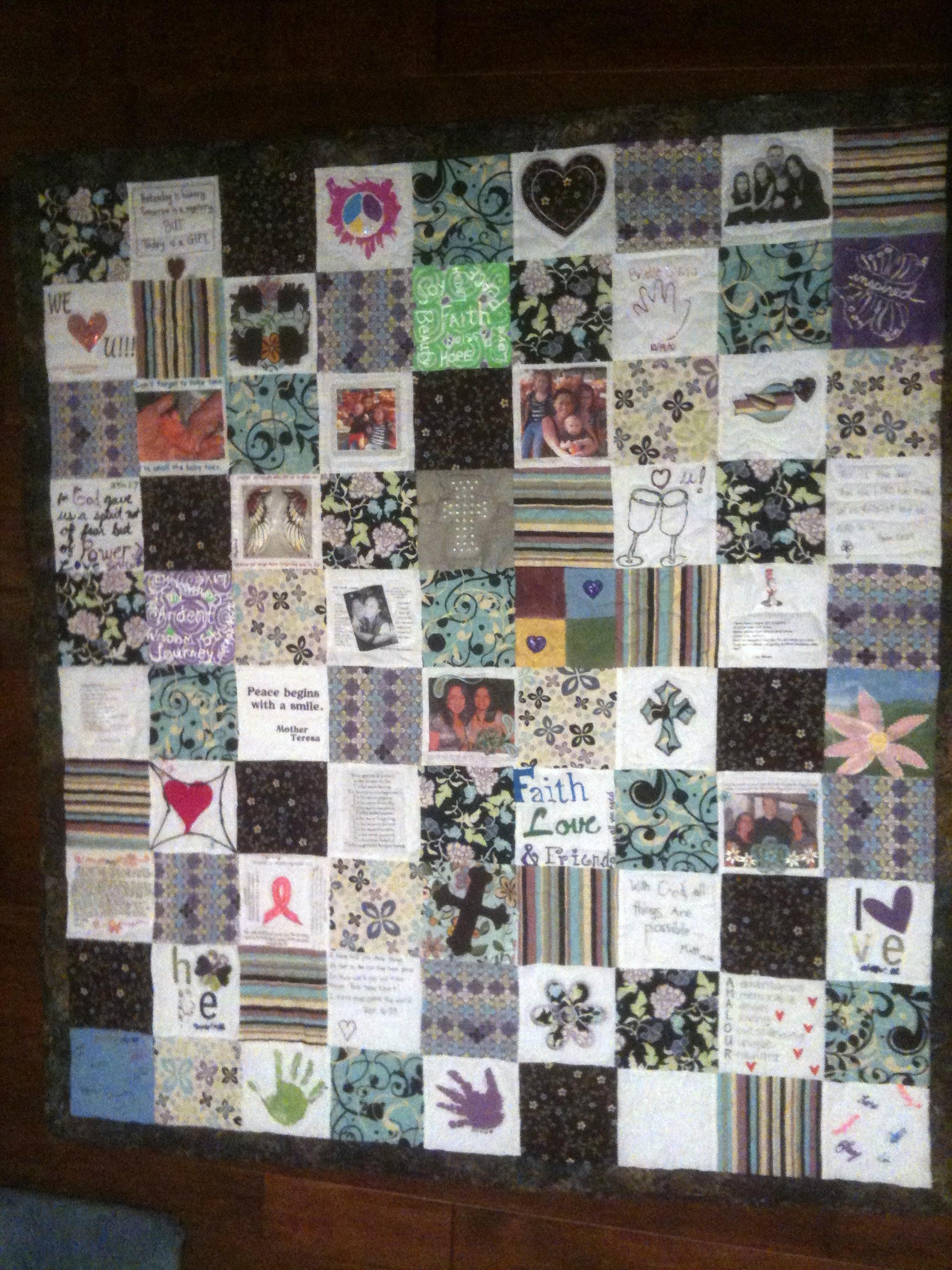Love, Love, Love
I grew up in a house where we said “I love you” a lot. It was a statement of appreciation (“Thanks, Mom! Love you!”), a farewell (“Love you! Bye”), a part of the bedtime routine from childhood through adulthood, (“Goodnight! I love you!”), as well as an expression of sentiment (“Happy Birthday! I love you!”).
I frequently tell my husband, kids, siblings, parents, and friends “I love you!” And I mean it sincerely.
There is a bright shade of lime-green—also known as Julie-green—which I love. I love red wine and dark chocolate. I love cheese. I love my Vita-Mix, my iPhone, and the way my washer and dryer beep me a song when they’re finished a cycle (instead of buzzing). I love Austin.
I recently had the privilege of helping to create a quilt filled with messages of love and support for a dear friend who (after four years in remission and a full mastectomy) is facing a second bout of breast cancer.

A few days ago, my 3 ½ year old got sick in the middle of the night. He came to my bedside and in the saddest, most heartbreaking voice said, “Mommy, I had an accident and it got all over.” Without hesitation I jumped up and consoled him. Within a split second of surveying the scene, I called my husband in to tend to Max while I cleaned up the mess. The whole thing was quite unpleasant, but handled with tremendous love.
With all the different ways we use the word love, it’s a good idea to take a moment to reflect upon what exactly we mean. I am the first to admit my laziness when it comes to distinguishing between like and love. My love of places and things is really about enjoyment. And when it comes to wine, chocolate, technology, and Austin, that enjoyment is pretty intense.
In English, we have one all-inclusive word for love. In Greek, there are four distinct words. I appreciate the insight that C.S. Lewis gives in The Four Loves as he defines and describes each one and their relation to one another.
- Storge – (pronounced with two syllables, and a hard “g” ~ STORE-GAY) A love rooted in a natural fondness or affection. This is often the love we find within families, between parents and children or siblings. The expression “blood is thicker than water” reflects storge love.
- Philia – (the root word in Philadelphia; pronounced PHILLY-AH) true friendship love, involving loyalty, equality, respect, and the bonds of shared interests and activities.
- Eros – (the root word of erotic ~ ERR-OS) refers to a passionate love. This is certainly the intimate love of romance, but it is not necessarily sexual. Eros refers to the passionate love which touches the depths of one’s soul with excitement, energy, and beauty.
- Agape (pronounced both as AH-GAH-PAY and AH-GAH-PEE) is the unconditional giving of oneself—selflessly—for the good of another.
C.S. Lewis wisely points out that as we come to understand the different kinds of love, we shouldn’t feel the need to categorize a relationship or even a given experience as exclusively one of the four kinds of love. There is often quite a bit of overlap.
I find myself quite fortunate to have all four kinds of love for my husband. I have always had a fondness for geeks, so he started off with quite a bit of storge. Our friendship grew as we discovered our mutual appreciation of live music and outdoor fun (in Austin). The mutual respect that followed offered us a great foundation for philia, which we continually cultivate with quality time. Over time, we developed eros, with a passionate and energetic connection that feeds my spirit. And we undoubtedly practice agape with each other, with our children, and with the world around us.
I like that CS Lewis affirms that all love is good; we needn’t rate the four loves as superior and inferior. What we should do, however, is pay attention to the differences. Why? Just as we can get ourselves into trouble when we confuse love with like, things can also go awry when we confuse philia with agape (thinking we have to be friends with everybody).
In faith, we are called to “Love one another as I have loved you” (John 13:34). But Jesus was not calling us to practice eros, storge, or philia. Jesus loves us with agape and calls us to practice agape—unconditional care and concern for the well-being of another—with those we encounter. Agape is the theological virtue of which St. Paul speaks in his First Letter to the Corinthians. Recognizing it as a virtue means that agape is the kind of love we can choose to practice, and become better at practicing.
As you think about who you love, consider also how you love. Which of the four loves do you find abundantly in your life? Which do you find yourself being nudged to cultivate more of and why?
“Heavenly heart © Depositphotos.com/christas”



